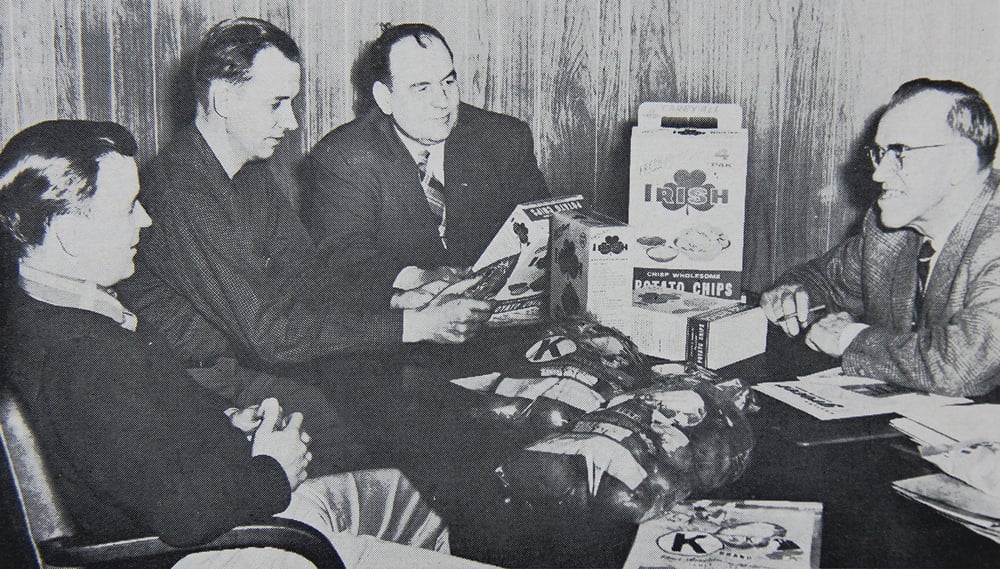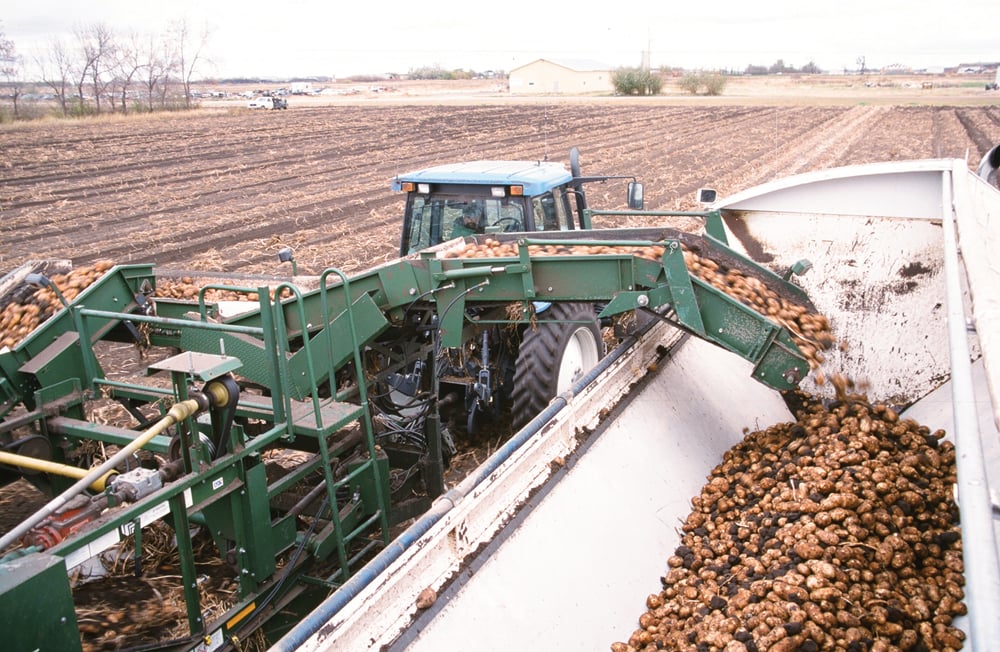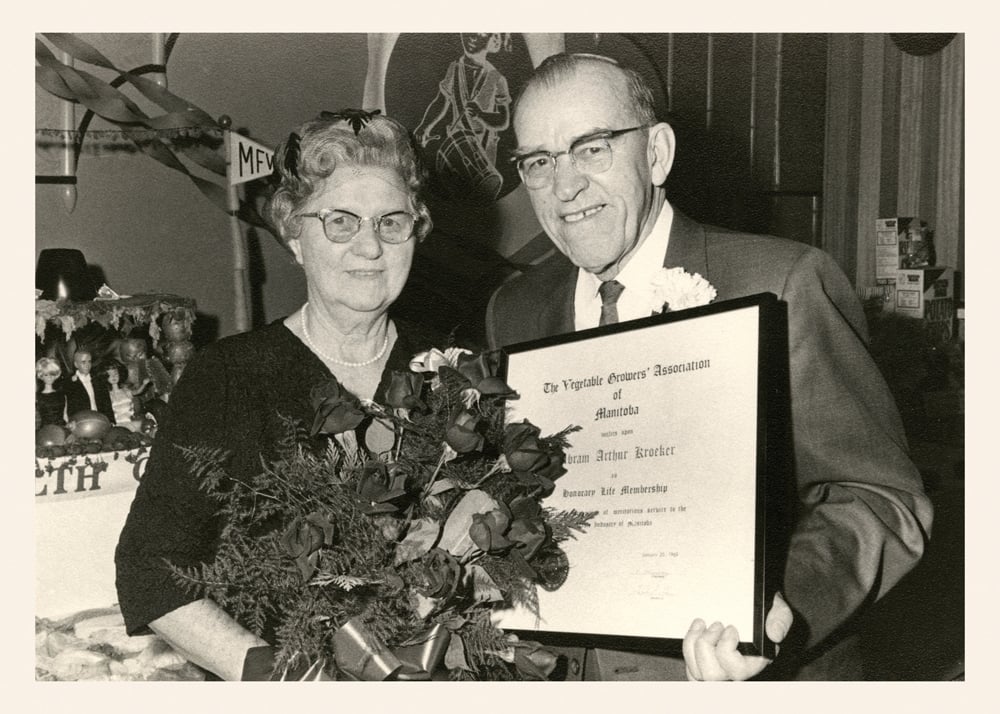In the embryonic days of Peak of the Market, Wally Kroeker recalls a farmer threatening to thrash his dad.
His father, Walter, was a staunch proponent of orderly marketing for his potatoes and vegetables. The other farmer was not.
“My dad was a pretty conservative guy,” Kroeker said. “Some people could never understand why a conservative guy would get involved in what we called, benignly, orderly marketing… that’s socialistic.”
Read Also

Global humanitarian aid slashed by one-third
Humanitarian aid around the world was cut by a third in 2025 and Canada is one of the culprits.
Walter Kroeker thought farmers wouldn’t be able to compete if they didn’t band together. Orderly marketing, as he saw it, was a noble venture — even if a portion of vegetable farmers raged against it.
This year, as Peak of the Market quietly relinquished its government-mandated monopoly on Manitoba root crops, the growers presented a united front.
They were happy to see it go. But why?
Co-operative marketing roots
Until the late 1930s, the bulk of Manitoba’s market gardens grew within what is now the city of Winnipeg.
At the time, H.C. Whellams grew pickling vegetables on a tract of land between Henderson Highway and the Red River, says A Century of Horticulture in Manitoba, edited by P.J. Peters. J.P. Haarsma grew leaf lettuce where Concordia Hospital now stands.
The Connery family grew vegetables and bedding plants along the Red River in St. Vital, Beth Connery told the Co-operator. Her father-in-law, Ed Connery, started working with his father, James Connery, in the 1950s.

Farmers sold directly to picklers and canneries, to grocers or at markets around the city. The Central Farmers’ Market, established in 1914, stood behind Winnipeg’s City Hall.
“Picture a Saturday night in the summer,” wrote Peters. “Workers had just been paid and they and their wives were eager to lay in next week’s supplies… The elite were also there in their finery… Above the din of the sales chatter came the strident musical notes of the Sally Ann.”
The Connery family sold there until 1961, Peters wrote.
Nearby, “Fruit Row,” a strip of warehouses on Ross Avenue in central Winnipeg, served as the hub of fruit distribution on the Prairies.
Facing a dog-eat-dog, disorganized market, several groups of growers teamed up to market their produce.
One such group was called Winnipeg Gardeners Co-op, formed in 1947 with James Connery as one of its founders.
They were hauling vegetables to Fruit Row in old banana boxes, said Connery. They wanted to look professional, and hopefully get better prices.
Winnipeg Gardeners Co-op registered the brand “Peak of the Market.”
They settled at the corner of Ross Avenue and Ellen Street on Fruit Row and built a “50 by 100” building to house grading and washing equipment, Peters wrote.
The group pooled sales, deducted commission, and paid a net price to the growers. Growers had to sell their entire crop through the group and were assured a portion of the firm’s sales through a quota system.
The Winnipeg Gardeners Co-op amalgamated with its competitor, the Manitoba Vegetable and Potato Growers Co-op Association, in 1956 to form Gardeners Sales Ltd. It took over the Peak of the Market Brand.
In 1960, Gardeners moved into a 65,000-square-foot facility on King Edward Street. Besides washing and grading equipment, it had temperature-controlled storage. That’s where Peak of the Market still stands.
Regulation
Peak growers say their organization’s predecessors formed so growers could better negotiate prices with grocers instead of competing against each other. But Peters adds an extra detail: In the 1950s, Manitoba vegetables weren’t known for being good.
Insects and disease control were lacking. Grading was poor. Wholesalers and consumers weren’t keen to buy, Peters wrote. Gardeners Sales members grew good stuff, but their poor-quality competitors dragged them down.
“Imported produce predominated and Manitoba-grown potatoes and vegetables went begging for sales or drew low and depressed prices,” Peters said.

In 1953, the Vegetable Growers Association of Manitoba (VGAM) formed under provincial supervision to address those quality and promotional issues. Quality control efforts succeeded, wrote Peters, but producers still struggled to get good prices. VGAM needed a marketing solution. They decided they wanted a government-mandated board — in other words, to force participation.
Voluntary participation was a key weakness of the co-operatives, wrote Avis Mysyk in Manitoba Commercial Market Gardening 1945-1997. The growers lacked discipline and incentive to stay organized.
The Winnipeg Gardeners Co-operative anticipated this back in the 1940s.
“There was always the great temptation for members to sell on the open market for a few cents higher price when it suited them and then to run to the pool when things got tough,” wrote Mysyk, quoting Gardeners documents.
Before it could compel orderly marketing in Manitoba, the VGAM had to convince Manitoba growers.
Two attempts in the late ’50s and early ’60s failed to gain enough producer support. In 1964, the VGAM convinced the province to take a stab at compulsory marketing. It incorporated Gardeners Sales as the Manitoba Potato Marketing Commission.
That commission was successful enough that the province added the Manitoba Vegetable Marketing Commission on Dec. 1, 1965. The new commission caught almost immediate flack.
“Why was the all-powerful agency established without a vote by the growers?” wrote a Winnipeg Tribune columnist in March 1966. “It’s already clear that some producers are in sharp disagreement with their operations being controlled by the commission.”
Then-Agriculture Minister George Hutton defended it, saying the potato commission had demonstrated that “a controlled market could stabilize prices and provide growers with a higher return,” the Tribune report added.
The commission quickly met VGAM objectives, but this wasn’t good enough for some growers, Peters wrote.
A Tribune report from 1966 gives an example in which the VGAM chastised a group of “rebel growers” for making “false insinuations” to reporters.
The article mentions one grower who “became a ‘martyr,’” after the commission refused to market his cabbage. The cabbages were the “size of baseballs,” the VGAM retorted.
The Liberals and New Democrats accused the Conservative government of making a power-grab, wrote Mysyk. They argued control should stay in the hands of producers.
Growers also staged protests against compulsory marketing, Mysyk added.
The province caved and scrapped the commission in April 1967, but this too was met with protest.
“Market agency killed,” blared the front page of the Tribune. The next day, the newspaper reported VGAM leaders had met with the government to demand a referendum and were assembling farmers and their trucks outside the legislature to protest.
They got their referendum, and in 1968 the Manitoba Vegetable Producers’ Marketing Board and the Manitoba Root Crop Producers’ Marketing Board formed.
In 1972, legislation passed that allowed both boards to be elected from members. Walter Kroeker, Wally’s dad, was one of the first elected vegetable board members, a 1972 Manitoba Co-operator report said. Ed Connery chaired the root crop board, said another Co-operator article.
The boards were responsible for administering production quotas, ensuring farmers got fair prices for their crops, marketing and promoting the produce, providing production statistics and ensuring a continuous supply of vegetables on the market, a 1972 Co-operator article says.
The two groups amalgamated a decade later to form Peak of the Market.
Pax vegetabilis
For the Connerys, the Kroekers and Peak chair Peter Loewen’s family, the establishment of orderly marketing brought an era of stability and expansion.
Loewen’s family joined Peak of the Market because they planned to start growing table potatoes. Processing potatoes, which they already grew, weren’t regulated by Peak.
Because they knew Peak would market the potatoes, they felt safe to try them, Loewen said.
Peak gave stability to the potato industry, and that helped his family expand the farm to support a growing family.
“I really don’t think I’d be here if we had not been growing potatoes,” he said.

Ed Connery, now farming near Portage la Prairie, branched into broccoli and more summer vegetables based in part on that confidence, Beth Connery said.
Peak’s sales team meant farmers had one fewer task.
“I think it made it easier at the time for them to do the agriculture — to do the growing because they did not have to work on the selling,” Connery said.
Kroeker family lore has it that an orderly marketing environment made growing potatoes a more stable, reliable industry, Kroeker said. There was more incentive for growers to get in and stay in because of the quota system, and people felt less risk adverse.
As a result, processors saw that the Red River Valley was good for growing potatoes and were encouraged to set up shop, Kroeker said.
Loewen records indicate there were many vegetable processors in Manitoba well before the days of orderly marketing. However, by the time he wrote his history book in 1980, the province had four big and stable processors: Campbell Soup Co., Old Dutch Foods, Carnation Foods (formerly Simplot) and McCains. Together, they processed more than 80 per cent of all potatoes grown in Manitoba.
“This made Manitoba a well-respected exporter in many world markets,” he wrote.
Can Peak take credit for that? At least in part, say its longtime members.
The pinch
But by nature, compulsory, orderly marketing means less freedom.
For example, Peak set off a media flurry when it came down on an Otterburne farmer in 2009. He was selling his small ‘creamer’ potatoes directly to a grocer, the Winnipeg Free Press reported. By regulation, he had to sell through Peak.
“Now they’re telling me I can’t even sell potatoes in a shack on my own property,” the farmer told the Free Press.
Exemptions for small growers were put in place in 2011, but farmers could plant no more than five acres of potatoes and no more than one acre of carrots and onions to remain unregulated.
While many small growers fell well below that ceiling, others found their growth capped.
“No matter how good or how efficient you were, you had this artificial cap on your production,” Direct Farm Manitoba president Phil Veldhuis told Co-operator after the province announced Peak’s deregulation. Direct Farm Manitoba represents small growers and farmers’ markets.
“You go to your local grocery store, and you see P.E.I. organic potatoes and you know that the organization that isn’t allowing you to produce more potatoes has bought those and delivered those to the grocery store,” Veldhuis said.
But Peak also found itself caught in regulatory thickets. It wasn’t keeping up with the rest of the North American industry, said Wayne Rempel, president and CEO of Kroeker Farms.
Peak had strict packaging regulations, Rempel said. Until rules were relaxed in recent years, everything had to be packed in Winnipeg even though Kroeker Farms had the capacity to do it themselves.
It also wasn’t aggressive enough in its marketing, nor did it have the capacity to meet evolving industry needs, Rempel said.
Big grocers want companies that can meet all their needs, he said. They want baby potatoes, organic potatoes, fingerlings — not just reds, yellows and russets — in all their stores, and they want to get them through one company.
Peak didn’t have that capacity. Yet, Peak couldn’t — or perhaps failed to — expand much because of its non-profit, regulated structure.
“We didn’t really know who owned Peak of the Market,” said Loewen.

The rules said when Peak set up a distribution centre in Calgary, it had to rent a building. By law, it couldn’t buy land. This reduced efficiency.
About 40 per cent of the product was shipped to the United States but most was in bulk because Peak couldn’t own a packaging facility in the U.S., CEO Pamela Kolochuk told provincial officials during a committee hearing on Bill 12, which dismantled Peak.
“Most of our growers are, you know, half an hour from the border,” she said.
The rules said new growers could join Peak, but the quota they got for free wasn’t enough to turn a profit, Connery said.
No one objected to new members, but the restrictions made it nearly impossible, he added.
Peak of the Market’s grower base had shrunk to 12 as the industry consolidated and members left the group. There were more than 12 vegetable and potato farmers, but the others grew products Peak didn’t regulate, such as processing potatoes.
Loewen recalled there once being more than 40 members. In 1968, the Tribune reported that 203 growers were in favour of orderly marketing, representing more than 65 per cent of Manitoba potato and vegetable farmers. This suggests there were more than 300 growers at one time.
Loewen asked how much regulation was needed among 12 growers who all know each other and get along.
“It became antiquated,” Rempel said. “What we needed back then we didn’t need any longer.”
Members knew they needed to expand if they wanted to succeed, Loewen said. About two years ago, they started talking about deregulation.
They considered changing the legislation but growers thought removing regulations entirely would be best, Kolochuk told the committee.
Moving on
Today Peak of the Market is re-forming as a private, for-profit company with the 12 growers as shareholders.
This will give growers the freedom to grow whatever they want, Kolochuk told the committee. It may also allow more growers to enter the market. Growers will be free to work directly with retailers.
Because they’re for profit, they’ll be able to be more aggressive, said Rempel. The growers want to see Peak thrive, pay dividends and become more valuable as a company.
“It’s not just about profit, it’s about being good,” Rempel said.
They’re just starting to figure out the mindset, added Loewen.
“We’re still in the growing pains stages.”


















